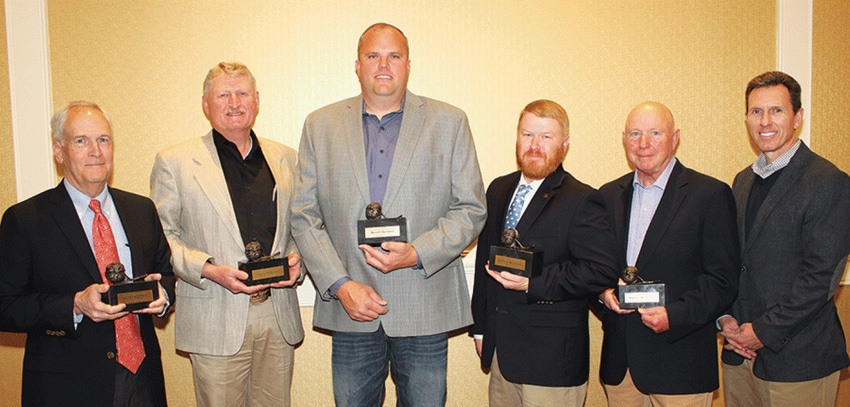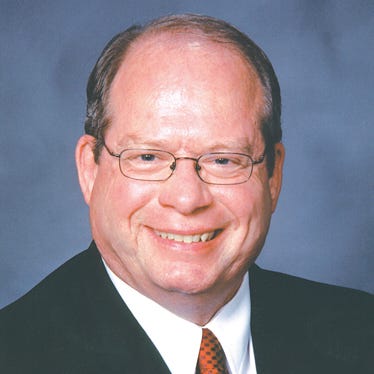
Five growers who have achieved success by implementing technology innovations to create more efficient and sustainable farm operations received the prestigious 2017 Farm Press-Cotton Foundation High Cotton Award on March 3 during the 2017 Farm & Gin Show held in Memphis, Tenn.
The award-winning cotton growers include: father and son Ronnie and Andrew Burleson, Richfield, N.C. (Southeast states); Byron Seward, Louise, Miss. (Delta states); Brent Hendon, Welch, Texas; and Mark McKean, Riverdale, Calif. (Western states).
Each winner received a bronze cotton boll during the High Cotton Award breakfast, the 23rd annual award program since the program began in 1994. Nearly 100 cotton growers have been honored with the award to date.
“We’re very proud of this year’s winning class and the conservation ideals they represent,” said Forrest Laws, lead content director with Penton-Farm Press Publications. “Each of them is dedicated to their land and environment; leaving it better than they found it.”
Laws called the winners “true stewards of the soil, air, and water. This year’s winners exemplify the Best of the Best.”
To qualify for the award, nominees must meet three criteria: be a full-time grower; produce a profitable cotton crop; and use environmentally sound production methods while producing high quality cotton.
RONNIE AND ANDREW BURLESON – SOUTHEAST STATES
Ronnie and Andrew Burleson grow cotton, corn, soybeans, wheat, beef cattle, turkeys, and hogs on their 4,200 acre operation.
The Burleson family successfully farms crops on land (hills) not ideally suited for row crop production. Innovations incorporated by the family include conservation of the soil, conservation tillage, no till grain, and growing wheat as a cover crop before cotton planting to reduce soil erosion, improve weed suppression, and increase moisture retention.
In accepting the award, Andrew said, “Cotton has been good to our family. It’s something we hope to pass onto the next generation.”
BYRON SEWARD – DELTA STATES
Paying attention to detail on production, efficiency, and conservation led to the selection of Byron Seward as a High Cotton Award recipient. Byron and his son Darrington farm about 20,000 acres including cotton, corn, and soybeans.
The Sewards utilize remote sensing to determine exact equipment location in numerous fields in real time, equipment operation efficiency, yield data at harvest, and other factors impacting crop performance and yield. They utilize precision agriculture technology for plant growth regulators and defoliants on their cotton crop.
Byron says, “I appreciate conservation – precision agriculture is all about conservation. Conservation of our resources is very important to pass along to our children.”
BRENT HENDON – SOUTHWEST STATES
Southwest Farm Press Editor Ron Smith introduced Brent Hendon as a “good farmer, sound conservationist, devoted family man, and well respected in his community.”
Hendon farms 4,000 acres in water dependent West Texas. His crop mix includes cotton, peanuts, wheat, triticale, and occasionally milo.
“We have bought and paid for everything with cotton. We stay with it in good times and bad,” notes Hendon.
He irrigates 75 percent of his acreage with center pivots low elevation spray application or LESA. A FieldNet control system monitors and manages the pivots from his smartphone. He also employs soil conservation practices, crop rotation, and resistant weed management strategies.
MARK MCKEAN – WESTERN STATES
Mark McKean farms about 4,000 acres of cotton, wine grapes, processing tomatoes, alfalfa, wheat, and barley in California’s central San Joaquin Valley. His cotton crop is usually rotated with tomatoes and wheat.
“We’re sticklers on conservation and sustainability,” says Mark who farms in the desert with about 11 inches of annual rainfall. “We’ve put a huge investment into making our water go further with drip systems – buried drip and above ground drip systems.”
The McKean family, which also includes wife Megan plus sons Wyatt and Conner, places much emphasis on environmental stewardship over the last decade, including variable rate applications of nitrogen and Pix. Reduced N has helped protect groundwater while variable rate-applied Pix has improved defoliation and created a more uniform crop at picking.
The family’s pro-environment philosophy also includes the sparing use of crop protection materials and integrated pest management.
“Spraying a chemical is the last thing I want to do,” says McKean.
NCC KUDOS
Gary Adams, president and chief executive officer with the National Cotton Council, congratulated the High Cotton Award winners, noting that their innovation places a premium on efficiency and parlays into practices that protect their land, air, and water.
“This not only leaves a minimal environmental footprint but I also suspect it’s boosting their profitability on the farm,” Adams said.
About the Author(s)
You May Also Like






